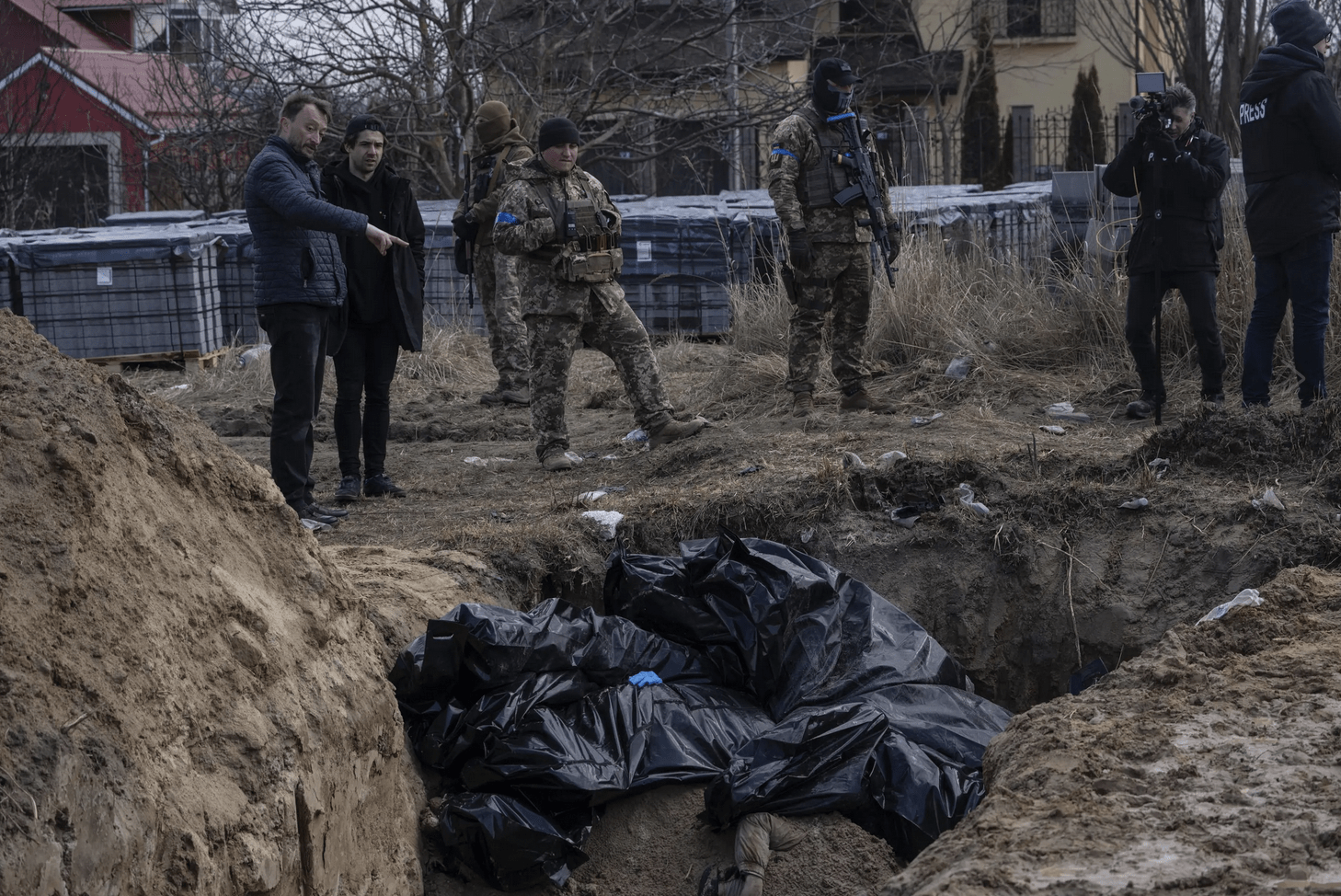UNGA 2023: Canada Can Help Hold Putin Accountable for His Crimes
 A mass grave in Bucha, Ukraine, on April 4, 2022/AP
A mass grave in Bucha, Ukraine, on April 4, 2022/AP
Irwin Cotler, Allan Rock and Brandon Silver
September 17, 2023
The United Nations General Assembly (UNGA) will re-open this week. To mark the occasion, presidents and prime ministers will take their turn at that famous podium, filling the New York air with the usual mixture of cant, clichés and self-promotion. Once the speeches are over, however, UN member states will have the opportunity to achieve something meaningful at this year’s UNGA by creating a special international tribunal for the crime of aggression committed by Vladimir Putin in Ukraine. Canada should make the establishment of the International Criminal Tribunal for the Russian Federation a priority.
Putin’s war crimes and crimes against humanity have shocked our collective conscience. We were all witness to the barbarism in Bucha, the bombing of hospitals and maternity wards, and the forced deportations of over 1.1 million Ukrainians, including 250,000 children. The Chief Prosecutor of the International Criminal Court (ICC), Karim Khan, is commendably prioritizing the investigation of such atrocities, and his partnership with Ukrainian and other European prosecution services is a model of collaboration. Chief Prosecutor Khan is exercising singular leadership, which we should fully support. However, the crime of aggression—the crime that lies at the heart of all of Putin’s atrocities — is not within the ICC’s jurisdiction.
The crime of aggression is defined in the Rome Statute as “the planning, preparation, initiation or execution, by a person in a position effectively to exercise control over or to direct the political or military action of a state, of an act of aggression which, by its character, gravity and scale, constitutes a manifest violation of the Charter of the United Nations.” It is therefore, by definition, a “command crime”, for which only those in control of the aggressor state can be held responsible, rather than the foot soldiers who carry out their commands.
Why does the crime of aggression merit the establishment of a special tribunal to assess responsibility and determine guilt? Because Putin’s invasion was not only an assault on the sovereignty, independence and territorial integrity of Ukraine – that would be criminal enough. It was also a frontal attack on the UN Charter and the rules-based order, breaching fundamental norms that safeguard international peace and security and thereby putting peoples around the world at grave risk.
In order to pre-empt questions of constitutional validity and suggestions of immunity, the special tribunal must be purely international in both origin and character.
For that, Putin must be held accountable. Allowing impunity for his crime of aggression would embolden bad actors the world over. If he is seen to escape responsibility, others could be tempted to indulge their territorial ambitions: Costa Rica and its neighbours are vulnerable to invasion from Nicaragua and Venezuela; Taiwan and other east Asian democracies are threatened by China; and ongoing territorial disputes in Africa could erupt into open war. Regional leaders who share the vision of a peaceful world anchored in the rule of law rather than the rule of the sword should be focal points in our efforts to establish such a special tribunal, which will require broad global buy-in.
And the special tribunal to be established by UNGA must be truly international. Neither a domestic Ukrainian court nor a “hybrid” arrangement that combines Ukrainian and international law will suffice. In order to pre-empt questions of constitutional validity and suggestions of immunity, the special tribunal must be purely international in both origin and character.
Ordinarily, the United Nations Security Council would establish this tribunal. But the Council cannot do so because a veto-wielding permanent member is the subject of concern. We therefore turn to UNGA which has consistently condemned Putin’s war.
Canada belongs to a core group of UN member states that support the creation of the special tribunal. By making it a priority at the upcoming UNGA, by deploying our diplomatic efforts and rallying others to the cause, Canada can catalyze support to produce the plurality of votes needed for the resolution.
As Canada’s newest honorary citizen and leading Russian dissident and political prisoner Vladimir Kara-Murza described it, an international judicial process will be essential in publicly airing and educating Russians on the crimes of the Putin regime, and therefore essential in building the foundation for a liberal democratic post-Putin Russia that does not repeat the mistakes of the past. Achieving a Russia at peace with its neighbours requires prosecuting and publicly punishing the crime of aggression.
The UNGA is often derided as a “talk shop”: an expensive rubber stamp for the path of least resistance. But at its best, the General Assembly defends the collective interests of humanity against the self-serving interests of unscrupulous governments. At this year’s UNGA, we can rise to that higher purpose once more by defending the UN Charter, upholding international law and advancing democracy and the forces of freedom.
Irwin Cotler is former Minister of Justice and Attorney General of Canada and longtime parliamentarian; Allan Rock is former Minister of Justice and Attorney General of Canada and former Ambassador to the UN; Brandon Silver is an international human rights lawyer and Director of Policy and Projects at the Raoul Wallenberg Centre for Human Rights.
